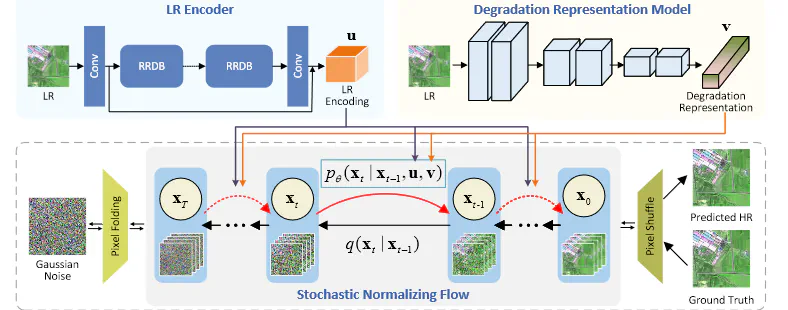Conditional Stochastic Normalizing Flows for Blind Super-Resolution of Remote Sensing Images
 Flowchart
FlowchartAbstract
Remote sensing images (RSIs) in real scenes may be disturbed by multiple factors, such as optical blur, undersampling, and additional noise, resulting in complex and diverse degradation models. At present, mainstream super-resolution (SR) algorithms only consider a single and fixed degradation (such as bicubic interpolation) and cannot flexibly handle complex degradations in real scenes. Therefore, designing an SR model that can deal with various degradations has gradually attracted researchers’ attention. Some early studies estimate degradation kernels and then perform degradation-adaptive SR but face the problems of estimation error amplification and insufficient high-frequency details in the results. Although blind SR algorithms based on generative adversarial networks (GANs) have greatly improved visual quality, they still suffer from pseudo-texture, mode collapse, and poor training stability. This article proposes a novel blind SR framework based on the stochastic normalizing flow (BlindSRSNF) to address the above problems. BlindSRSNF learns the conditional probability distribution over the high-resolution image space given a low-resolution (LR) image by explicitly optimizing the variational bound on the likelihood. BlindSRSNF is easy to train and can generate photorealistic SR results that outperform GAN-based models. In addition, we introduce a degradation representation strategy based on contrastive learning to avoid the error amplification problem caused by explicit degradation estimation. Comprehensive experiments show that the proposed algorithm can obtain SR results with excellent visual perception quality on both simulated LR and real-world RSIs. The code is available at
.
Type
Publication
IEEE Transactions on Geoscience and Remote Sensing